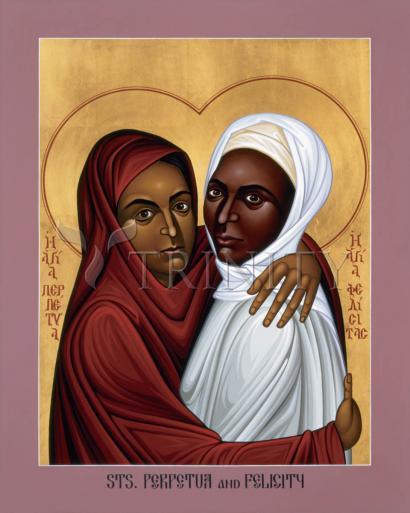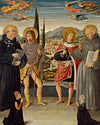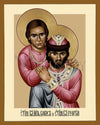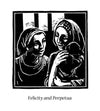Collection: Sts. Perpetua and Felicity

-
Sale
Wood Plaque Premium
Regular price From $99.95 USDRegular priceUnit price per$111.06 USDSale price From $99.95 USDSale -
Sale
Wood Plaque
Regular price From $34.95 USDRegular priceUnit price per$38.83 USDSale price From $34.95 USDSale -
Sale
Wall Frame Espresso
Regular price From $109.95 USDRegular priceUnit price per$122.17 USDSale price From $109.95 USDSale -
Sale
Wall Frame Gold
Regular price From $109.95 USDRegular priceUnit price per$122.17 USDSale price From $109.95 USDSale -
Sale
Wall Frame Black
Regular price From $109.95 USDRegular priceUnit price per$122.17 USDSale price From $109.95 USDSale -
Sale
Canvas Print
Regular price From $84.95 USDRegular priceUnit price per$94.39 USDSale price From $84.95 USDSale -
Sale
Metal Print
Regular price From $94.95 USDRegular priceUnit price per$105.50 USDSale price From $94.95 USDSale -
Sale
Acrylic Print
Regular price From $94.95 USDRegular priceUnit price per$105.50 USDSale price From $94.95 USDSale -
Sale
Giclée Print
Regular price From $19.95 USDRegular priceUnit price per$22.17 USDSale price From $19.95 USDSale -
Custom Text Note Card
Regular price From $300.00 USDRegular priceUnit price per$333.33 USDSale price From $300.00 USDSale
ARTIST: Br. Robert Lentz, OFM
ARTWORK NARRATIVE:
Sts. Perpetua and Felicity were North African friends martyred for their Christian faith in the amphitheater at Carthage. We know precise details of their imprisonment because Vibia Perpetua, a twenty-two year old of a distinguished noble family, kept a journal -- the first known written document by a woman in Christian history, with a concluding narrative by an eye-witness.
Perpetua mentions that those arrested with her were a slave named Felicity and three men, Saturninus, Secundulus, and Revocatus. She details the misery of their cell, the efforts her father made to persuade her to recant, the naming of her family members, everyone who helped the martyrs, and those who condemned them. One person conspicuous in not being mentioned was her husband. As a noblewoman, she would have been married, but, for whatever reason, he was not there for her when one would think he would have been most needed. The person there for her was Felicity, who was expecting to give birth at any time.
Perpetua’s greatest concern was that she have her baby son with her as long as she lived. Felicity was worried that she might not be allowed to die with her companions because of her pregnancy. In answer to prayer, she gave birth to a girl. The pain of the delivery was compounded by the mockery of the jailer; but she was assisted and comforted by Perpetua. On the day of their death, they alone refused to wear the required pagan costumes -- insisting on maintaining the dignity of their femaleness. They gave each other the kiss of peace, held on to each other as they were attacked by wild animals, and were finally beheaded.
The companionship of these women inspired subsequent ages. Their feast has always been called by their names. Together they are named in the Roman Canon of the Mass. Perpetua’s journal became such a beloved text in North Africa that St. Augustine felt he had to warn people not to give it a reverence due only to Scripture.
Perpetua’s feast day is March 7.
- Art Collection:
-
Men & Women of the Bible,
-
Holy Ethnic Images,
-
Saints & Angels
- Patronage:
-
Widows,
-
Sterility,
-
Martyrs,
-
Male Children,
-
Death of Children,
-
Cattle
- Lentz collection:
-
Saints, Martyrs and Holy People,
-
Black Images of Holiness
“When my father in his affection for me was trying to turn me from my purpose by arguments and thus weaken my faith, I said to him, "˜Do you see this vessel—waterpot or whatever it may be? Can it be called by any other name than what it is?' "˜No,' he replied. "˜So also I cannot call myself by any other name than what I am—a Christian.'"
So writes Perpetua, young, beautiful, well-educated, a noblewoman of Carthage in North Africa, mother of an infant son and chronicler of the persecution of the Christians by Emperor Septimius Severus.
Despite threats of persecution and death, Perpetua, Felicity (a slavewoman and expectant mother) and three companions, Revocatus, Secundulus and Saturninus, refused to renounce their Christian faith. For their unwillingness, all were sent to the public games in the amphitheater. There, Perpetua and Felicity were beheaded, and the others killed by beasts.
Perpetua's mother was a Christian and her father a pagan. He continually pleaded with her to deny her faith. She refused and was imprisoned at 22.
In her diary, Perpetua describes her period of captivity: “What a day of horror! Terrible heat, owing to the crowds! Rough treatment by the soldiers! To crown all, I was tormented with anxiety for my baby.... Such anxieties I suffered for many days, but I obtained leave for my baby to remain in the prison with me, and being relieved of my trouble and anxiety for him, I at once recovered my health, and my prison became a palace to me and I would rather have been there than anywhere else."
Felicity gave birth to a girl a few days before the games commenced.
Perpetua's record of her trial and imprisonment ends the day before the games. “Of what was done in the games themselves, let him write who will." The diary was finished by an eyewitness.
Saint Perpetua:
Died: Martyred 7 March 203 at Carthage; beheaded after being mauled by wild beasts.
Saint Felicity:
Felicity was a rich widow whose 7 sons were martyred in front of her just before her own execution.
Died: Martyred in 165 at Rome; buried beside the Via Salria
Additional Items Our Customers Like
-

Sts. Nicholas of Tolentino, Roch, Sebastian, Bernardino of Siena, with Kneeling Donors (by Museum Religious Art Classics)
-

Saints Presenting Devout Woman to Blessed Virgin Mary and Child (by Museum Religious Art Classics)
-

Sts. Romanus of Antioch and Barulas (by Museum Religious Art Classics)
-

Sts. Boris and George the Hungarian (by Br. Robert Lentz, OFM)
-

Sts. Felicity and Perpetua (by Julie Lonneman)
-

Suffering Servant (by Br. Mickey McGrath, OSFS)


















